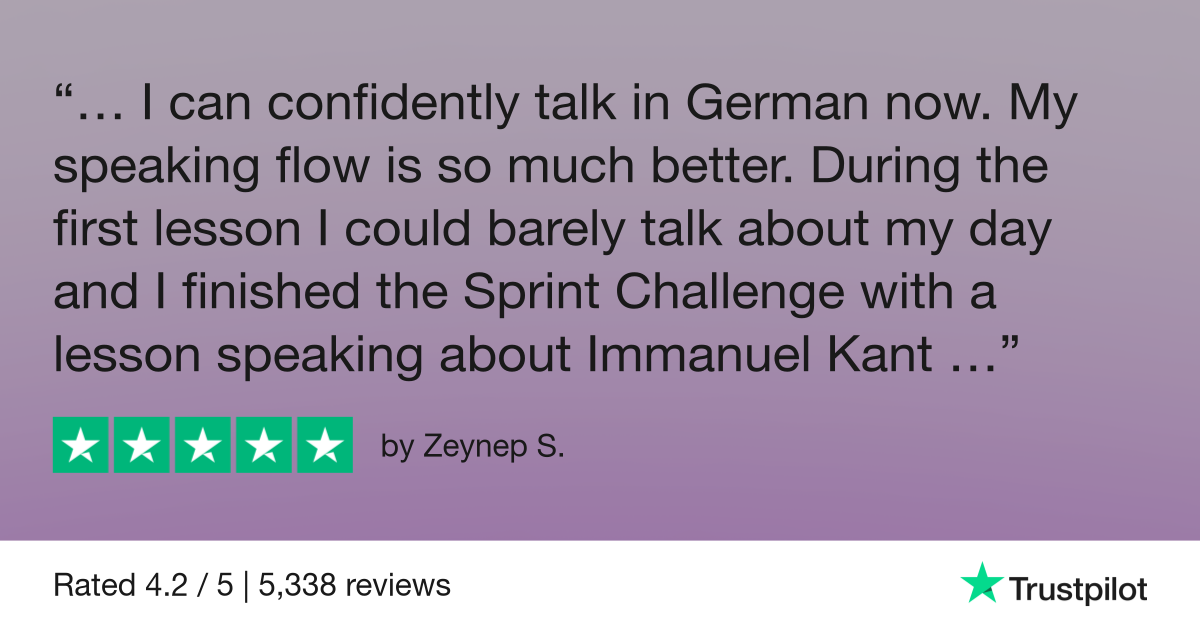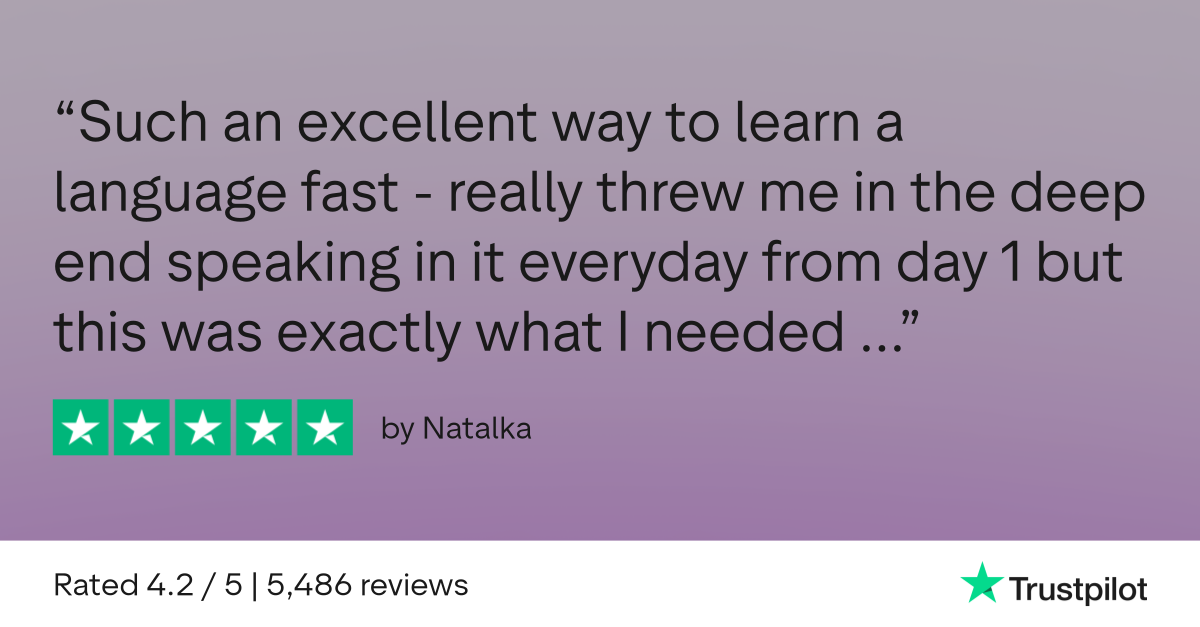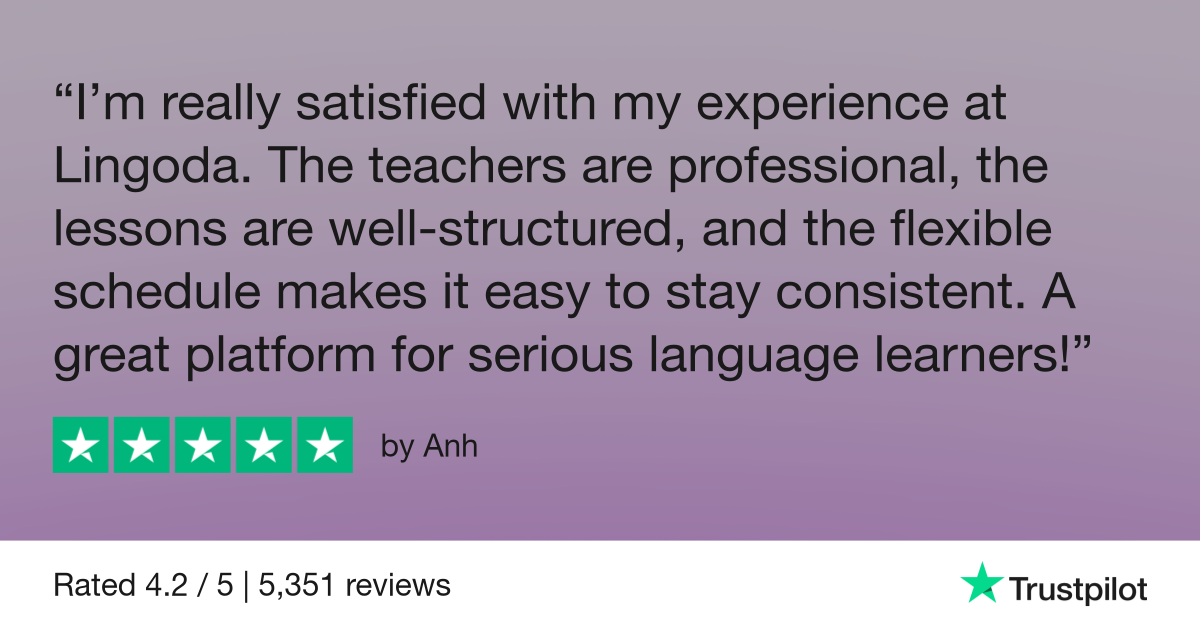How to practice your German: The complete guide to building fluency fast
During your German language practice, you’ll hit stages where learning feels different; not stuck, just ready for a new approach.

Building fluency isn’t just about memorizing rules and vocabulary, it’s about habit: practicing a little every day until it becomes part of your routine, even when you’re busy.
In this guide, you’ll learn why consistent practice matters, how to work on each German skill, helpful tips for an effective practice routine and how to track your progress across CEFR levels.
- Why practicing German feels hard (and how to fix it)
- Why consistent practice matters
- How to practice each German skill
- Types of practice activities (across all skills)
- Practical tips to make your German practice stick
- FAQs
Why practicing German feels hard (and how to fix it)
If German language practice feels frustrating, you’re not alone. Complex grammar, low confidence and inconsistent study routines are common challenges for language learners. The good news? You can overcome them all. The key is realistic, manageable, daily practice. Studying a little every day helps turn learning into a habit and makes speaking feel far less intimidating.
That’s where Lingoda comes in. With structured courses and flexible scheduling, it provides a motivating framework to help you learn German effectively.
Why consistent practice matters
If you’ve ever wondered how long it takes to learn German, the answer depends largely on how consistently you practice. Frequent practice helps your brain form habits and retain language more effectively than occasional intensive sessions. That’s because consistency reinforces neural pathways, making it easier to recall what you’ve learned. On the other hand, irregular practice doesn’t support the formation of these pathways, forcing you to relearn what you’ve already forgotten.
German practice also looks different across CEFR levels:
- A1: building basic phrases and training your listening skills
- A2: moving from isolated phrases to more connected speech
- B1: handling everyday situations, familiar topics and short texts
- B2: shifting from everyday contexts to abstract topics and opinions
To progress through the CEFR levels, you need all four skills:
- Listening: from slow dialogues to podcasts
- Speaking: from rehearsed phrases to spontaneous conversation
- Reading: from signs to articles
- Writing: from forms to emails and essays
Let’s look at how to practice each skill effectively.

Learn German with Lingoda
How it works

How to practice each German skill
Speaking — Build confidence and flow
To develop fluency and good pronunciation, you need consistent speaking practice. Start with self-talk, shadowing online videos and recording yourself, then progress to role-plays with conversation partners. Make use of tools like AI chatbots, Lingoda’s flexible small-group classes or Discord voice rooms.
Listening — Train your ear for real German
To improve comprehension and natural phrasing, begin with German podcasts like Slow German, then explore YouTube channels such as Easy German. You can also tune in to the best German radio stations like DW Radio for more spontaneous speech. Combine active listening at home, pausing and repeating what you hear, with passive listening during commutes.
Reading — Expand vocabulary naturally
To expand your vocabulary and master syntax, make German reading practice part of your daily routine. Start with graded readers, then progress to news sites, blogs and social media captions. Read aloud to improve pronunciation, highlight key verbs and nouns, then summarize what you have read in your own words.
Writing — Reinforce grammar and expression
Writing regularly is one of the most effective German language practice exercises for building grammatical accuracy and developing creative use of the language. Start with simple tasks such as to-do lists, short journal entries or writing prompts. When you feel more confident, move on to short emails and forum posts. To support your learning journey, use tools like Grammarly in German, Lingoda’s writing tasks or translation-back exercises.
Grammar — The foundation of fluency
Accuracy and sentence flexibility both start with grammar. Try short daily drills on cases, verb forms and tenses to internalize the rules and recall them more easily. Use fill-in-the-blank apps to test yourself, join Lingoda grammar sessions to clear up doubts and challenge yourself with regular self-tests to track your progress.
Types of practice activities (across all skills)
Solo practice
Solo practice is especially useful at the beginning of your learning journey, when you still need to control your own pace and focus. Use self-talk and keep a daily journal to narrate your actions, use flashcards or label your home with sticky notes to memorize and review common words and phrases, listen to short clips and write down what you hear to strengthen both listening and spelling.
Partner and community practice
The best way to build fluency is by practicing with others. Use platforms such as Tandem and Speaky or find a study buddy for language exchanges. You can also join Reddit or Discord groups to chat and ask questions or take Lingoda’s German online classes to receive feedback and learn authentic, real-life language.
Immersive and media practice
German language practice also means immersing yourself in everyday life and gaining cultural awareness, for example through exposure to entertainment. Watch TV shows or series with subtitles, listen to podcasts, music or audiobooks to train your sense of rhythm and expand your vocabulary. Follow German social media creators to see how the language is used informally. You can even change your device language to German, turning every interaction with your phone into a micro exercise.
Digital and AI-assisted practice
Digital tools can also enhance your learning and provide effective German language practice exercises. Chat with ChatGPT and AI tutors or dictate your journal entries to them to see how well they understand you. Use gamified apps like Duolingo or Memrise to reinforce vocabulary and maintain motivation. Take regular CEFR tests to track your progress and identify areas for improvement.
Structured classroom practice
Another way to boost your learning is through structured classroom practice. Lingoda Flex, for example, offers 24/7 scheduling, so you can book classes at times that work for you and maintain consistency in your learning. Lingoda also has programs such as Sprint for those who want to practice intensively for rapid improvement, Business German to build professional vocabulary and conversation classes to enhance fluency. The key advantage of all Lingoda courses is guided feedback: native-level teachers correct mistakes you might not notice, explain why and show you how to improve.
Practical tips to make your German practice stick
If you use the right strategies, staying consistent with your learning becomes much more manageable. The tips below offer helpful ways to make your German language practice part of your routine:
- Set micro-goals (e.g., 10 minutes speaking daily).
- Mix skill types weekly (balance input + output).
- Track progress with recordings or CEFR tests.
- Reward consistency, not perfection.
- Join challenges or Lingoda Sprint for accountability.
- Rotate between solo, social and immersive modes to prevent burnout.
- Keep a “German wins” journal to celebrate milestones.
How can I practice German on my own?
Talk to yourself in German, keep a daily journal, review words with flashcards or sticky notes, listen to short audio clips and write down what you hear.
How many hours should I practice each day?
The ideal amount of daily practice is around 30–60 minutes, but even 15 minutes of focused work can lead to noticeable progress. What matters most is consistency, so pick a duration you can realistically maintain every day.
Make German part of your everyday life
The key to mastering your German language practice is consistency. If you feel stuck or aren’t making progress, it’s likely that you haven’t found the strategies that work best for you yet. Focus on building learning habits over time rather than trying to memorize a large amount of material at once. Track your progress regularly and remember to reward yourself for every milestone you reach.A good way to stay consistent is by getting direct feedback from teachers and practicing conversations with other students. That’s exactly what Lingoda’s German courses are designed for. With different and flexible learning paths, you can set your own pace and keep improving consistently.

Learn German with Lingoda
How it works












